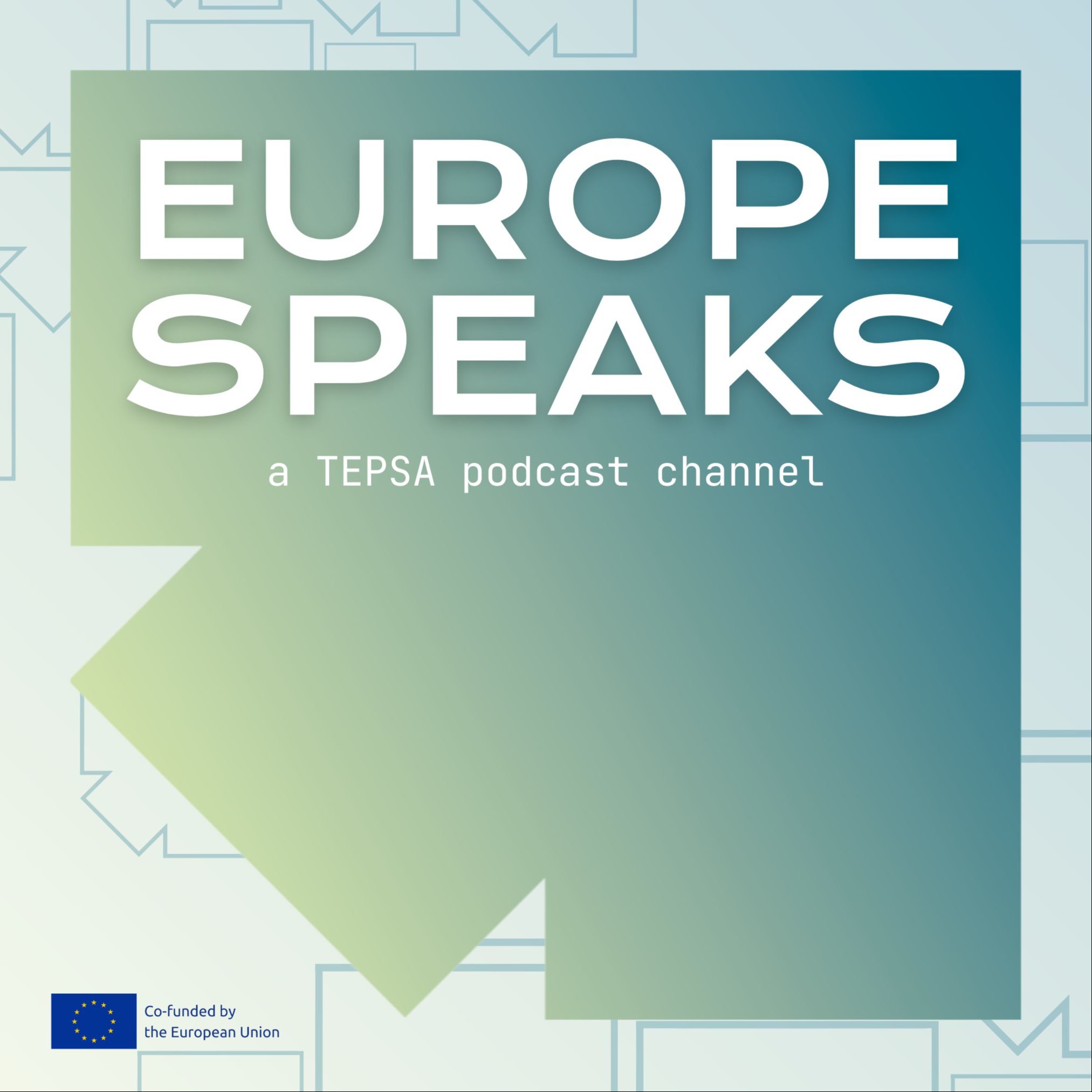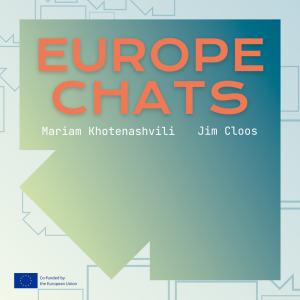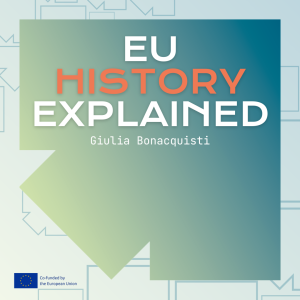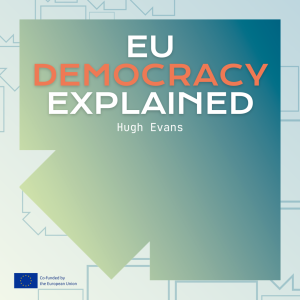
Welcome to ‘Europe Speaks’, a podcast channel by the Trans European Policy Studies Association (TEPSA) where we explore everything to do with the European Union: history, current affairs, and the future of Europe. We publish regular podcasts on all these topics, including EuropeChats with Jim Cloos and Mariam Khotenashvili, and a series of other webinars, explainers, and interviews with the world’s leading experts on the EU!
Episodes

51 minutes ago
51 minutes ago
This episode of EuropeChats is a discussion between Giselle Bosse, Professor at Maastricht University, and TEPSA Executive Director Mariam Khotenashvili. The discussion focuses on the EU enlargement process in the context of a turbulent geopolitical landscape and against the backdrop of Russia’s war against Ukraine.
Giselle Bosse is full professor at Maastricht University, Visiting Professor at the College of Europe and a fellow at the European Democracy Hub. She is a leading expert on EU democracy support, Eastern Neighbourhood and European security.
EuropeChats is the flagship podcast of TEPSA and it is part of the TEPSA Podcast Channel “Europe Speaks”
Music: Worakls, 22 September 2014, Salzburg, Hungry music
This video is co-funded by the Citizens, Equality, Rights and Values programme of the European Union
Co-Funded by the European Union.

7 days ago
7 days ago
In this new episode of EU History Explained, Giulia Bonacquisti, Programme Manager at the Trans European Policy Studies Association (TEPSA), takes a look at the history of the European Commission, the institution that proposes laws, defends the common European interest, and acts as ‘guardian of the Treaties’. We’ll look at how it grew from a bold post-war experiment into a key force shaping today’s Union.
This video takes us from Jean Monnet’s idea to pool together France and Germany’s coal and steel industries following the end of the Second World War with the European Coal and Steel Community and its High Authority, through the establishment of the European Communities and the subsequent merger of their executives, including the High Authority, into the European Commission, right up to the Commission of today.
EU History Explained is TEPSA’s video series exploring the origins of the modern EU. If you have ever wondered how the European Union of today came to be, or what lies behind the talk of politics being shaped in ‘Brussels’, then this is the series for you!
We would like to warmly thank the following institutions for their support in the production of this video: Historical Archives of the European Union, Jean Monnet House, European Parliament Partnerships Team.
Script: Giulia Bonacquisti
Recording & Editing: Barbara Vanotti & Hugh Evans
Music: Garrett Bevins - Infinite - Infinite (Wondershare Filmora X)

Monday May 19, 2025
EU History Explained – A history of the European Parliament
Monday May 19, 2025
Monday May 19, 2025
In this new episode of EU History Explained, Giulia Bonacquisti, Programme Manager at the Trans European Policy Studies Association (TEPSA), takes a look at the history of the European Parliament, an institution at the heart of pan-European democracy. We'll learn about the world’s first experiment in transnational democracy, whose members are unique among international parliamentary assemblies insofar as they are directly elected by the citizens they represent. We'll also learn about how the Parliament's powers have expanded over the course of the European project from the 1950s to today.
This video takes us from the creation of the European Coal and Steel Community in 1951, a key step in the post-war Schuman Plan to secure lasting peace in Europe by pooling the French and German coal and steel industries, and the High Authority which managed this arrangement, through the decision to create a Common Assembly of appointed members to hold the supranational High Authority accountable, and beyond. From this origin, we trace the history of the Common Assembly under various guises - from European Parliamentary Assembly to today's directly elected European Parliament, noting the key moments where its powers and representativeness have evolved over the years.
EU History Explained is TEPSA’s video series exploring the origins of the modern EU. If you have ever wondered how the European Union of today came to be, or what lies behind the talk of politics being shaped in ‘Brussels’, then this is the series for you!
We would like to warmly thank the following institutions for their support in the production of this video: Historical Archives of the European Union, European Parliament Partnerships Team.
Script: Giulia Bonacquisti
Recording & Editing: Barbara Vanotti & Hugh Evans
Music: Garrett Bevins - Infinite - Infinite (Wondershare Filmora X)

Friday Feb 14, 2025
EuropeChats – Can the EU be a true SUPERPOWER? | Discussion with Marc De Vos
Friday Feb 14, 2025
Friday Feb 14, 2025
This episode of EuropeChats is a discussion between Marc De Vos, CEO of the Itinera Institute and author of "Superpower Europe: The European Union's Silent Revolution", and TEPSA Secretary-General Jim Cloos. The discussion focuses on the place of the European Union in the world, its potential to rival the major powers, and what it needs to harness that potential.
Marc De Vos is CEO and founder of Itinera. His expertise is wide-ranging, covering the European Union, globalisation, and economics among others. He is a professor at Ghent University, a published author, and a strategic consultant.
EuropeChats is the flagship podcast of TEPSA and it is part of the TEPSA Podcast Channel “Europe Speaks”
Music: Worakls, 22 September 2014, Salzburg, Hungry music
This video is co-funded by the Citizens, Equality, Rights and Values programme of the European Union
Co-Funded by the European Union.

Wednesday Dec 11, 2024
EU Democracy Explained – Can the EU protect our democracies?
Wednesday Dec 11, 2024
Wednesday Dec 11, 2024
The European Union is built on a set of supposedly shared values among its Member States, defined in the Treaties as "human dignity, freedom, democracy, equality, the rule of law and respect for human rights". But democratic backsliding means that even if a Member State 'signs up' for these at time of accession, it's no guarantee that this commitment will remain during their membership.
In this episode of EU Democracy Explained, the second in a two-part mini-series on democratic backsliding in Europe, Hugh Evans explains why Article 7, infringement procedures, and the rule of law conditionality regulation may not be all they're cracked up to be in terms of protecting the quality of democracy in the EU. We also look at what might change in future, looking ahead to the new Commission under President Ursula von der Leyen.
EU Democracy Explained is a series where we delve into detail about what democracy actually is and how it works in Europe, and ask ourselves: “what makes the EU democratic?”
Script, Recording & Editing: Hugh Evans
Music: Wondershare Filmora X
Co-funded by the European Union. Views and opinions expressed are however those of the author(s) only and do not necessarily reflect those of the European Union or European Education and Culture Executive Agency (EACEA). Neither the European Union nor the granting authority can be held responsible for them.

Tuesday Dec 10, 2024
EU Democracy Explained – Is democracy FAILING in the EU?
Tuesday Dec 10, 2024
Tuesday Dec 10, 2024
We all have a basic instinct for what kinds of governments are and aren't democratic, but have you ever thought about how to actually define 'democracy'? It's harder than you might expect...
In this video, Hugh Evans asks a crucial question: is democracy failing in the EU? The European Union's democracy is built on a foundation of dual legitimacy provided by directly elected MEPs on the one hand and democratically elected national governments on the other. So what happens if one of these national governments becomes undemocratic?
EU Democracy Explained is a series where we delve into detail about what democracy actually is and how it works in Europe, and ask ourselves: “what makes the EU democratic?”
Script, Recording & Editing: Hugh Evans
Music: Wondershare Filmora X
Co-funded by the European Union. Views and opinions expressed are however those of the author(s) only and do not necessarily reflect those of the European Union or European Education and Culture Executive Agency (EACEA). Neither the European Union nor the granting authority can be held responsible for them.

Thursday Aug 29, 2024
EU Democracy Explained – What is the European Council?
Thursday Aug 29, 2024
Thursday Aug 29, 2024
In this video, Hugh Evans explores the ways in which national politicians, in addition to their role in the legislative process via the Council, can help steer the overall direction of the European Union. To this, we need to focus on an EU institution that is not actually part of the legislative process. This is the place where the Heads of State or Government meet to discuss pressing issues, react to crises, and set the European agenda: the European Council.
EU Democracy Explained is a series where we delve into detail about what democracy actually is and how it works in Europe, and ask ourselves: “what makes the EU democratic?”
Script, Recording & Editing: Hugh Evans
Music: Wondershare Filmora X
Co-funded by the European Union. Views and opinions expressed are however those of the author(s) only and do not necessarily reflect those of the European Union or European Education and Culture Executive Agency (EACEA). Neither the European Union nor the granting authority can be held responsible for them.

Thursday Jul 04, 2024
Thursday Jul 04, 2024
This episode of EuropeChats is a discussion between Enrico Letta, former Italian Prime Minister and President of the Institut Jacques Delors, and TEPSA Secretary-General Jim Cloos. The discussion follows our series of interviews with former members of the European Council to mark the 50th anniversary of the institution, but also focuses on Mr. Letta's vision for the future of the European project, based on his recent report "Much more than a market".
This episode is a discussion with Enrico Letta . Enrico Letta is President of the Jacques Delors Institut, Dean of the School of International Affairs at Sciences Po Paris (PSIA) and former Italian Prime Minister. He has also been a Member of the Chamber of Deputies between 2006 and 2015. Letta was Minister of European Affairs from 1998 to 1999 and Minister of Industry from 1999 to 2001, and served as Secretary to the Council of Ministers from 2006 to 2008. He is a founding member of the Democratic Party.
EuropeChats is the flagship podcast of TEPSA and it is part of the TEPSA Podcast Channel “Europe Speaks”
Music: Worakls, 22 September 2014, Salzburg, Hungry music
This video is co-funded by the Citizens, Equality, Rights and Values programme of the European Union
Co-Funded by the European Union.

Thursday Jun 06, 2024
EuropeChats – EU Enlargement, Democracy, and Security| Discussion with Erik Jones
Thursday Jun 06, 2024
Thursday Jun 06, 2024
This episode of EuropeChats is a discussion between Prof. Erik Jones, Director of the Robert Schuman Centre for Advanced Studies at the European University Institute, and TEPSA Executive Director Mariam Khotenashvili. The discussion focuses on EU enlargement - but from a different angle than usual: people, not just institutions; firms, not just nation states; and also the security foundations of EU enlargement.
With the accession agenda firmly in the foreground of European politics once again, thanks to recent decisions to start accession negotiations with Ukraine and Moldova (agreed in December 2023 European Council) as well as with Bosnia and Herzegovina (agreed in the March 2024 European Council), it is more crucial than ever to explore the ins and outs of enlargement policy, and discuss the ways forward for EU candidate countries.
In particular, the discussion focuses on topics such as the de facto enlargement of the EU resulting from the influx of millions of people from the Western Balkans or Ukraine, as well as the business ties already established between the EU and candidate countries, in addition to topics like how to maintain the rule of law in an enlarged Union, and how to build democratic resilience.
This episode is a discussion with Prof. Erik Jones. Erik Jones is Director of the Robert Schuman Centre for Advanced Studies at the European University Institute and author, editor, or co-editor of books and special issues of journals on topics related to European politics and political economy. Professor Jones is co-editor of Government & Opposition and a contributing editor of Survival. His commentary has appeared in the Financial Times, the New York Times, and other major newspapers and magazines across Europe and North America.
EuropeChats is the flagship podcast of TEPSA and it is part of the TEPSA Podcast Channel “Europe Speaks”
Music: Worakls, 22 September 2014, Salzburg, Hungry music
This video is co-funded by the Citizens, Equality, Rights and Values programme of the European Union
Co-Funded by the European Union.
![EuropeChats – Le Conseil Européen du point de vue d'un Président de la Commission [FRANÇAIS] | Discussion with Jacques Santer](https://pbcdn1.podbean.com/imglogo/ep-logo/pbblog11377003/2_r5aua3_300x300.png)
Monday May 27, 2024
Monday May 27, 2024
This episode of EuropeChats takes place in French.
Cet épisode d'EuropeChats s'inscrit dans le cadre des activités variés de TEPSA sur le sujet des cinquantième anniversaire du Conseil Européen. Jim Cloos, Secrétaire Général de TEPSA, s'est rendu au Luxembourg pour parler avec l'ancien Président de la Commission Européenne Jacques Santer.
Le Président Santer a été Premier Ministre du Luxembourg entre 1984 et 1995, et Président de la Commission entre 1995 et 1999. Pendant son mandat à la Commission, Jim était son Chef de Cabinet.
Leur entretien porte sur les expériences de Monsieur Santer au sein du Conseil Européen en tante que Premier Ministre aussi qu'en temps que Président de la Commission. Cette discussion constitue une ressource importante d'une vie politique Européenne.
EuropeChats is the flagship podcast of TEPSA and it is part of the TEPSA Podcast Channel “Europe Speaks”
Music: Worakls, 22 September 2014, Salzburg, Hungry music
This video is co-funded by the Citizens, Equality, Rights and Values programme of the European Union
Co-Funded by the European Union.
